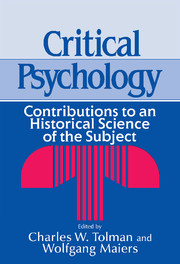Book contents
- Frontmatter
- Contents
- Preface
- Acknowledgments
- Contributors
- Critical Psychology
- 1 Critical Psychology: An Overview
- 2 Critical Psychology: Historical Background and Task
- 3 Societal and Individual Life Processes
- 4 Experience of Self and Scientific Objectivity
- 5 Psychoanalysis and Marxist Psychology
- 6 Emotion, Cognition, and Action Potence
- 7 Action Potence, Education, and Psychotherapy
- 8 Personality: Self-Actualization in Social Vacuums?
- 9 The Concept of Attitude
- 10 Client Interests and Possibilities in Psychotherapy
- 11 Play and Ontogenesis
- 12 Functions of the Private Sphere in Social Movements
- Bibliography
- Index
6 - Emotion, Cognition, and Action Potence
Published online by Cambridge University Press: 21 March 2010
- Frontmatter
- Contents
- Preface
- Acknowledgments
- Contributors
- Critical Psychology
- 1 Critical Psychology: An Overview
- 2 Critical Psychology: Historical Background and Task
- 3 Societal and Individual Life Processes
- 4 Experience of Self and Scientific Objectivity
- 5 Psychoanalysis and Marxist Psychology
- 6 Emotion, Cognition, and Action Potence
- 7 Action Potence, Education, and Psychotherapy
- 8 Personality: Self-Actualization in Social Vacuums?
- 9 The Concept of Attitude
- 10 Client Interests and Possibilities in Psychotherapy
- 11 Play and Ontogenesis
- 12 Functions of the Private Sphere in Social Movements
- Bibliography
- Index
Summary
In order to analyze the relationship of cognitive and emotional processes to action preparedness or action potence, we must pay attention to the subject's capacity to alter or not to alter relevant living conditions. This is important because it is precisely the active altering and cooperative influencing of relevant life relations that is specific to “human” life activity. That is what fundamentally distinguishes the human from the merely organismic mode of life. It is also important because it tends to be ignored by traditional psychology.
I will develop some aspects of this problem here and indicate some general conclusions. Some basic types of theories about the cognitive–emotional relationship will be examined for the ways in which they deal with the alterability or nonalterability of relevant living conditions by the individual. My analysis will be based on the functional and historical categories worked out earlier in Critical Psychological research on the relationship between cognitive and emotional processes (Holzkamp-Osterkamp, 1975, 1976; Holzkamp and Holzkamp-Osterkamp, 1977).
The procedure for critically working through traditional theories is one application of the general Critical Psychological methods for analyzing bourgeois theories (Holzkamp, 1977): The “one-sidedness” of particular theoretical conceptions is exposed by applying more comprehensive Critical Psychological categories; that is, their claims to universality are refuted, and it is shown how they are only relatively valid under particular historically determined conditions. Their relative knowledge value is then subsumed into the more comprehensive conceptions of Critical Psychology, which then gain for themselves a higher level of organization, differentiation, and empirical concreteness.
- Type
- Chapter
- Information
- Critical PsychologyContributions to an Historical Science of the Subject, pp. 102 - 133Publisher: Cambridge University PressPrint publication year: 1991
- 8
- Cited by



